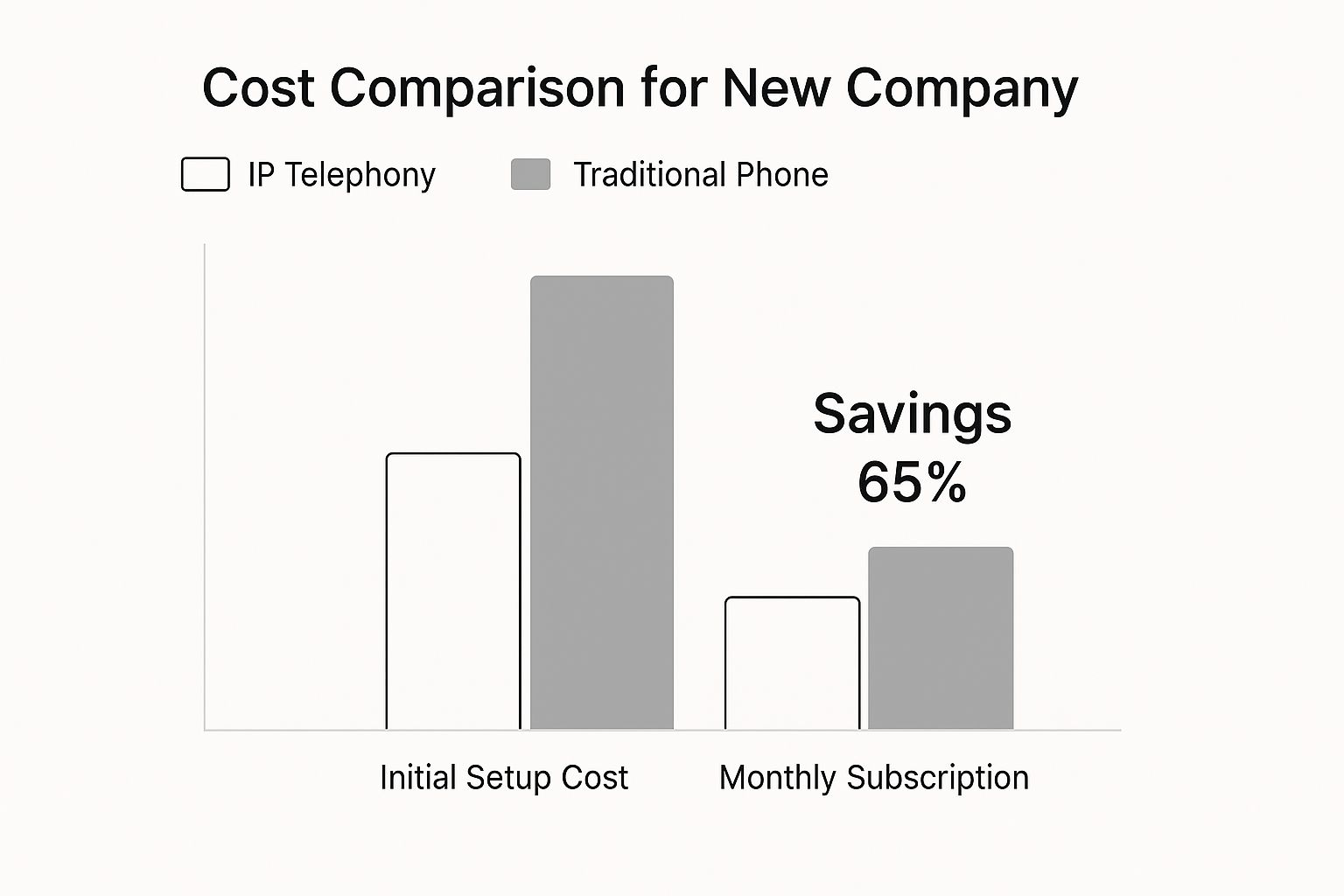
For a new company just starting out, the choice between an IP-based phone system and a traditional one isn't really a choice at all. IP Telephony is, by a huge margin, the smarter decision. Its built-in flexibility, significantly lower costs, and powerful features are exactly what a startup needs to stay agile and primed for growth. It’s simply the modern, forward-thinking way to handle business communications.
Why IP Telephony Is the Go-To for New Companies

When you're setting up your business, your communication system is one of the most critical foundational pieces. This decision directly impacts your budget, how efficiently your team works, and your ability to expand down the line. While old-school phone systems—the ones running on the Public Switched Telephone Network (PSTN)—were the only game in town for decades, IP Telephony, or Voice over Internet Protocol (VoIP), has rightly taken over as the standard for any business that needs to be quick on its feet.
Instead of relying on physical copper wires, a VoIP system works over the internet connection you already have, converting your voice into digital packets. This one change makes a world of difference. It means you can ditch the clunky, expensive on-site hardware that traditional systems depend on.
For a new company here in the UAE, the benefits are immediate and tangible:
- A much smaller upfront investment. You don’t need to buy a costly on-site Private Branch Exchange (PBX) box.
- Clear, predictable monthly bills. Most VoIP services operate on a subscription model, so budgeting becomes straightforward.
- Effortless scalability. Need to add a new team member to the phone system? It’s a matter of minutes, not waiting weeks for a technician to come and run new lines.
The real game-changer is agility. An IP system expands and adapts right alongside your business, in real-time. A traditional system, on the other hand, forces you to plan your growth around its physical limitations.
To put it into perspective, let's break down the most critical differences for a new business.
Key Differences at a Glance
This table cuts through the noise and shows you a direct comparison of what really matters when you're making this decision.
| Factor | IP Telephony (VoIP) | Traditional Phone System (PSTN) |
|---|---|---|
| Underlying Technology | Works over your internet connection (software-based) | Relies on physical copper wires (hardware-based) |
| Upfront Cost | Very low, often just the cost of IP-enabled handsets. | High, requires expensive PBX hardware and professional installation. |
| Scalability | Incredibly easy. Add or remove users instantly via a software dashboard. | Complex and slow. Requires new wiring, hardware, and technician visits. |
| Flexibility & Mobility | Excellent. Supports remote work, mobile apps, and use from anywhere. | Very low. Strictly tied to a physical desk in the office. |
As you can see, the contrast is stark. One system is designed for the way we work today—dynamic, distributed, and fast-paced—while the other is a relic of a different era.
Understanding the Core Technology Divide
Before you can pick the right phone system for your new company, you need to get your head around how they actually work. The fundamental difference is how your voice travels from one phone to another. This isn't just a choice about handsets; it's a decision about the very foundation of your business communication.

Grasping this core distinction is crucial. It’s what drives the massive differences in cost, flexibility, and features we’ll explore next.
The Digital Route: IP Telephony
IP Telephony, which you've probably heard called Voice over Internet Protocol (VoIP), is all about software. It works by converting your voice into tiny digital packets of data and zipping them across the internet—the same way you send an email or browse a website.
This clever approach means you don't need separate, physical phone lines at all. It runs on the same network your computers use, making it incredibly flexible and easy to connect with other digital business tools. The "brain" of the system is usually hosted in the cloud, not in a dusty box in your server room.
Because it treats voice as just another type of data, IP telephony can deliver advanced features like video conferencing, CRM integration, and mobile apps. These are things that are either impossible or wildly expensive to achieve with older phone systems.
The Analogue Path: Traditional Phone Systems
Old-school phone systems rely on the Public Switched Telephone Network (PSTN). Think of this as the classic network of physical copper wires that has been around for decades. It uses a method called "circuit-switching," which creates a dedicated, physical line between two phones just for the duration of that one call.
For a business, this typically meant installing a clunky piece of hardware on-site called a Private Branch Exchange (PBX). This box physically manages all the calls coming in and going out of the office, connecting to a set number of outside lines from the telecom provider.
This hardware-based setup is known for its reliability, but it's also incredibly rigid. Need to add a phone for a new hire? Moving someone to a different desk? You’d often have to call in a technician to physically rewire things. Exploring the range of modern telephony solutions makes it clear why this inflexible model is falling out of favour with agile startups in the UAE. For a growing company, that kind of inflexibility can be a major handicap.
A Practical Cost Analysis for New Companies
For any new business, the budget isn't just a spreadsheet; it's your lifeline. When you’re weighing up IP telephony against a traditional phone system, the financial side of things goes much deeper than just the initial price tag. Let's break down the real costs, because this decision can genuinely impact a startup's financial health for years to come.

The first thing you'll notice is the difference in setup costs. A traditional system requires a serious chunk of capital right out of the gate. You're looking at buying a bulky, on-site Private Branch Exchange (PBX) server, which doesn't come cheap. Then you have to factor in professional installation fees to run physical copper wiring to every single desk.
On the other hand, a hosted IP telephony system pretty much does away with those hefty upfront costs. The whole system lives in the cloud, so there's no expensive PBX hardware to purchase or worry about. Setup is mostly software-driven, meaning new companies can get started with affordable VoIP handsets or even just use softphone apps on the computers and mobiles they already own. It's a much lower barrier to entry.
Ongoing Operational Expenses
Once you're up and running, the recurring monthly bills show another clear split between the two options. Traditional phone systems are notorious for their variable and often unpredictable expenses.
- Line Rentals: You’re stuck paying a fixed monthly fee for every physical phone line coming into your office.
- Call Charges: Every call—local, national, and especially international—is billed by the minute. This makes your monthly costs a moving target that depends entirely on usage.
- Maintenance Contracts: That physical PBX box in your office needs looking after, which usually means a separate and often expensive service contract.
IP telephony flips this on its head with a predictable subscription model. Most providers offer a flat monthly fee per user, which often includes unlimited local and national calls. This makes budgeting incredibly simple—a massive win for a new business trying to manage its cash flow. Plus, international call rates are typically a fraction of the cost over VoIP.
From a pure economic standpoint, the savings and efficiency of IP telephony are huge drivers for new businesses. As PrecisionBusinessInsights.com points out, IP solutions are just more affordable because they run on your existing internet connection, cutting out the need for extra infrastructure. This cost-effectiveness is a game-changer for startups.
The True Cost of Growth
For a startup, scalability is everything. What does it actually cost you to grow? This is where the financial gap between the two systems widens into a canyon.
With a traditional system, adding just one new team member can set off a chain reaction of costs: new wiring, an available port on the PBX, and a call-out fee for a technician. Scaling is slow, expensive, and disruptive. It’s a capital project every time you hire.
An IP system, however, grows with you instantly. Need to add a new user? Just log into a web portal and activate a new license. The cost is small and predictable, letting your communications budget scale perfectly alongside your team, not in big, painful jumps.
This kind of agility is essential. To make sure everything runs smoothly as you expand, having the right technical backup is key. For companies here in the UAE, reliable IT support in Abu Dhabi can ensure your system scales without a single hiccup.
A Closer Look at Features and Functionality
When you're setting up a new company, your phone system isn't just about making and taking calls. It's about how your team works together and, crucially, how your customers perceive you. The features baked into your system can either supercharge productivity or leave you stuck in the past. This is where the divide between IP telephony and traditional phone systems becomes a chasm.
A classic landline system does the basics, no question. You'll get caller ID, call waiting, and voicemail. It's reliable, it works, but that's where the story ends. The feature list hasn't really changed in decades, which means it offers very little to help a modern, agile business get ahead. It’s a functional tool, but a limited one.
IP telephony, on the other hand, is built on software. Because it runs over the internet, it's designed to be dynamic, flexible, and packed with functionalities that traditional systems just can't match. For a UAE startup needing to make a big impact with a small team, this difference is everything.
Beyond a Dial Tone: Unified Communications
Think of IP telephony less as a phone and more as a complete communications hub. It’s the core of what we call Unified Communications (UC)—a fancy term for bringing all your communication channels into one intuitive platform. For a new business, this isn't just convenient; it's a massive efficiency boost.
Instead of your team jumping between different apps all day, they get one place for:
- Voice and Video Conferencing: Run your team meetings or pitch to a new client without needing a separate Zoom or Microsoft Teams subscription.
- Business Texting (SMS): Send appointment reminders or quick updates directly from your main business number. It looks professional and it’s what customers expect.
- Instant Messaging: Let your team chat internally to solve problems fast. It cuts down on endless email chains and keeps things moving.
This unified setup means communication just flows, whether your employee is at their desk in Dubai or working from home. A traditional system, by contrast, keeps all these tools separate, creating bottlenecks in your daily workflow.
The image below gives a clear visual on the cost side of things, showing how the lower upfront and running costs of IP Telephony make all these advanced features accessible.

It’s clear from the numbers that the savings on setup and monthly fees make investing in a feature-rich IP system a smart financial move right from the start.
Feature and Functionality Showdown
Let's break down exactly what each system offers and why it matters for a new company. This isn't just a list; it's about the real-world impact these features have on your day-to-day operations and your ability to grow.
| Feature | IP Telephony Availability | Traditional System Availability | Impact on a New Company |
|---|---|---|---|
| Unified Communications | Standard | Not Available | Streamlines teamwork by combining calls, video, and messaging into one platform, boosting efficiency. |
| CRM Integration | Common | Rare & Expensive | Provides instant customer context on calls, enabling personalised service and a more professional image. |
| Auto-Attendant | Standard | Add-on Cost | Gives even a one-person startup the polished feel of a larger enterprise, directing callers professionally. |
| Advanced Call Analytics | Standard | Very Limited | Offers crucial data on call patterns and team performance, helping you make smarter staffing and service decisions. |
| Call Recording | Standard | Add-on Cost | Essential for quality control, training new hires, and maintaining records for compliance. |
| Softphone/Mobile App | Standard | Not Available | Allows your team to make and receive business calls from anywhere on their laptop or mobile, ensuring you never miss a lead. |
The takeaway here is simple. IP telephony is designed for the way modern businesses operate. It’s packed with tools that help you work smarter, look bigger, and serve your customers better—all things that are non-negotiable for a startup looking to succeed in the UAE market.
Evaluating Scalability and Business Flexibility
Your company’s phone system should be a growth engine, not an anchor. When you're just starting out, especially in a dynamic market like the UAE, how your system adapts to change is a massive factor. This adaptability directly affects how quickly you can hire, expand, and embrace modern ways of working.
For any new business, growth can be explosive and unpredictable. IP telephony is built for exactly this scenario. Adding a new employee is a simple software change you can make in minutes through an online portal. No physical installation is needed, meaning your communications can scale in real-time right alongside your team.
Traditional systems paint a very different picture. Onboarding a new team member often kicks off a slow, expensive project. You have to call in a technician, run new physical wires through the office, and hope your on-site PBX box has a spare port. The whole process can take days, if not weeks, creating a serious bottleneck that gets in the way of agile growth.
Embracing Geographic Flexibility
In a global business hub like the UAE, not being tied to one location is a real strategic advantage. IP telephony fundamentally separates your communication from a physical office. An employee can connect to the business phone system from anywhere with an internet connection—their home, a co-working space, or even another country.
This is absolutely essential for supporting remote and hybrid teams. It ensures everyone stays connected and productive, presenting a unified, professional front to clients no matter where they are. It's a powerful edge that old-school, office-bound systems just can't match.
A traditional phone system chains your business to a physical office. An IP telephony system, however, gives your business the freedom to operate and hire talent from anywhere, turning your communications into a tool for borderless growth.
The move towards more flexible communication is undeniable. Market forecasts for the GCC show consistent growth for IP telephony, with projections for the UAE expecting major expansion through 2032 as more businesses make the switch. You can dig into the data and what it means for the market in the detailed research at TransparencyMarketResearch.com.
Ultimately, you need a system that supports where you're going, not just where you are. The physical limits of traditional phones mean that scaling often requires a big investment in new hardware and infrastructure. This can involve complex rewiring jobs, where getting the installation right is critical. Good structured cabling in Dubai is vital for a reliable network, but it’s a capital expense that IP systems almost entirely avoid. For a new company, the choice is pretty clear: pick a system that grows with you, not one you have to constantly grow around.
So, Which System Should Your New Company Choose?
After laying out the costs, features, and future potential of both systems, the path forward becomes pretty clear. For almost any new business, especially in a dynamic market like the UAE, IP telephony isn't just an option; it's the most sensible choice. It simply delivers the financial savings, operational muscle, and agility that a modern startup needs to get off the ground and compete.
Think about it. This technology is designed for the way we work now. It effortlessly supports team members working from different locations, plugs right into the business software you already use (like your CRM), and expands at a moment's notice. For a new company, these aren't just nice perks—they are genuine competitive advantages.
Is There Ever a Case for a Traditional System?
Despite the overwhelming advantages of VoIP, there is one very narrow, and increasingly rare, situation where a traditional system might be your only choice. If your business is set up in a location with no access to a reliable, high-speed internet connection, a classic landline might be the only way to make and receive calls.
However, given the UAE's world-class digital infrastructure, this is highly unlikely. And even if you find yourself in this situation, it’s best to view it as a temporary fix. The lack of modern features and the sheer cost of adding new lines will quickly put a ceiling on your company's growth.
Choosing your first communication system is a statement about the kind of company you want to build. IP telephony is a bet on flexibility and growth. A traditional system is a nod to a bygone era of business.
The shift to internet-based communication isn't just a trend; it's a global standard. Here in the Middle East and Africa, the VoIP market is expanding at a compound annual growth rate of 10.4%, driven by businesses keen to cut costs and improve efficiency. You can explore more data on the regional VoIP market to see just how fast things are changing.
Your Final Checklist
To make the decision crystal clear, run through these final questions:
- Do I need a system that lets my team work from anywhere—the office, home, or on the road?
- Is keeping my initial investment low and my monthly bills predictable a top priority?
- Would my business run better with features like video calls, call recording, and CRM integration?
- Do I plan for my company to grow, and need a phone system that can keep up without a fuss?
If you found yourself nodding "yes" to any of these, then IP telephony is the answer for your new business.
Frequently Asked Questions
When you're starting a new business, you have a lot of questions. Choosing your phone system is a big one, so let's tackle some of the most common concerns that come up when comparing modern IP telephony to old-school landlines.
Is IP Telephony as Reliable as a Traditional Landline?
This is probably the number one question I hear. The short answer is yes, absolutely—as long as your internet is solid. Modern IP telephony's performance hinges entirely on your internet connection. Here in the UAE, business-grade internet is excellent, which makes VoIP a very reliable choice.
Most serious providers back their service with formal guarantees, known as service level agreements (SLAs), promising a certain level of uptime. Plus, IP systems have a clever trick up their sleeve: if your office internet ever goes down, calls can be automatically rerouted to your mobile phone. That kind of built-in business continuity is something a traditional landline just can't offer.
For a new company, uptime is non-negotiable. The reliability of a quality IP telephony system, backed by a strong internet connection, is more than sufficient for today's business needs.
What Are the Security Risks with IP Telephony?
Because it runs over the internet, IP telephony does have to contend with potential cyber threats. It's a valid concern. However, any reputable provider worth their salt has this covered with robust, multi-layered security.
Think of it like this—they build a digital fortress around your calls using tools like:
- Call Encryption: Protocols like SRTP and TLS scramble your conversations, making them unintelligible to anyone trying to listen in.
- Network Monitoring: They have systems running 24/7 to spot suspicious activity or potential breaches before they become a problem.
- Fraud Detection: Algorithms are in place to flag unusual call patterns that might signal someone is trying to use your system without permission.
As a new business owner, your job is simply to partner with a provider who takes security as seriously as you do.
How Difficult Is Setting Up an IP Phone System?
This is where IP telephony really shines, especially for startups. Setting up a hosted IP system is worlds apart from the hassle of installing traditional phone lines. Forget about technicians drilling holes in walls and running complicated wiring.
Most of the setup is handled remotely by your provider. All you typically have to do is plug in a pre-configured desk phone or download an app (a "softphone") onto your computers and mobiles. For a new company that likely doesn't have a big IT department, this simplicity isn't just a convenience—it's a massive cost-saver.
Ready to equip your new business with a communication system built for growth? The experts at OMX Solutions L.L.C. can design and implement a scalable, feature-rich IP telephony solution perfect for your needs. Get started with OMX Solutions today.
